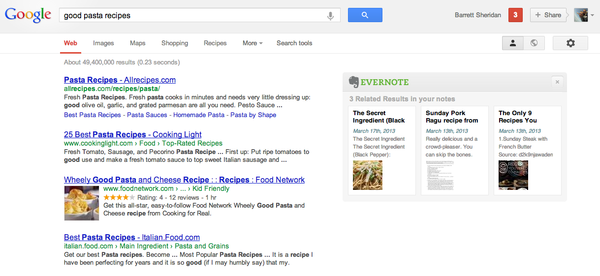Why Evernote Wins at Memory-Outsourcing
A year and a half ago I sat down with Evernote CEO Phil Libin for a wide-ranging chat. At the time, I was smitten with memory-decay algorithms, basically mathematical methods for learning new facts and concepts as efficiently as possible, and so of course I brought it up.
Phil didn’t have any immediate plans to include such a feature in Evernote. But he did have a really interesting response to the idea (which I’m paraphrasing because I can’t find my notes):
The hard part isn’t periodically reminding people of something they’re in the process of learning right now. It’s what happens in 5, or 10, or 20 years, when people have decades of memories and information stored in Evernote. It’ll be overwhelming. How do we smartly filter that information to remind people of what they already know when they need to know it?
It’s taken me a while but I’ve finally gotten hooked on Evernote, and one of my favorite features is a really modest, easily overlooked part of the browser plug-in. If you opt into the “Related Results” feature under the toolbar’s options, then when you run a Google search you’ll see something like this:
This is genius. Every time my mind latches onto a topic (at least when expressed in the form of a Google query), Evernote subtly reminds me what I already know about that idea. I’ve been surprised about how often I re-search topics I’ve already spent time exploring; I think most people will also be shocked by the redundancies in their learning processes. The “related results” box is also an unobtrusive way to reinforce ideas you’ve recently committed to memory.
From Dropbox to Drive to Instapaper and beyond, there’s no shortage of tools for outsourcing your memory. But no company is thinking as deeply and as creatively about how to access those memories, even (and especially) after they’ve spent years moldering away in your mind.
